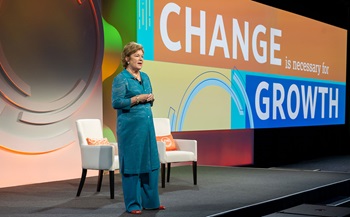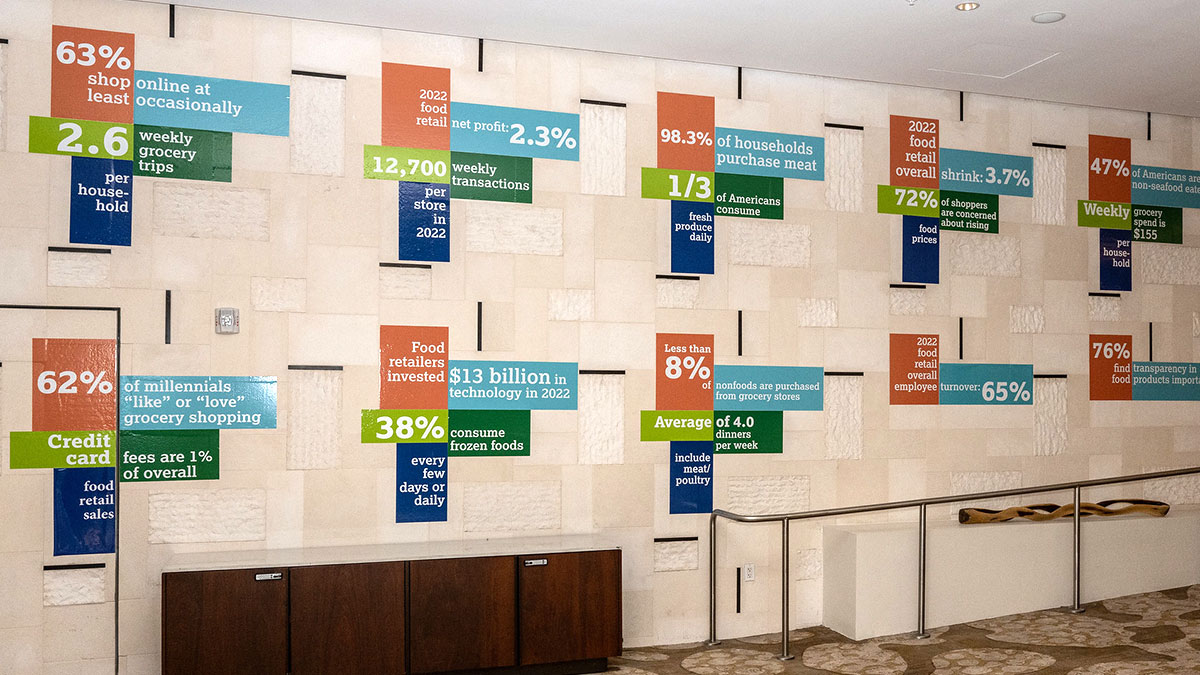By: Kelli Windsor, Senior Director, Digital Communications, FMI

FMI's Midwinter Executive Conference last week in Marco Island, Fla. focused on seizing the change with an agenda packed with technology and artificial intelligence (AI) presentations as well as imperative issues affecting the food business and supply chain. Here are some of the key lessons learned from the keynote presentations.
Embrace Change
FMI President and CEO, Leslie G. Sarasin walked the audience through the many ways the food industry has embraced change over the years including the development of the self-serve supermarket, the grocery cart and even the UPC code. Sarasin reminded us that the only thing permanent in life is change, and that it is essential to growth.
Sarasin also touched on the importance of personalization as we seek technology and AI solutions, sharing:
"Without a doubt, we need machine learning for its speed and ability to mine reams of data and turn that analysis into meaningful action. But that action must benefit our customers, provide us with greater insights into where they are on their journey, and help us anticipate their next moves so we can make every product or service offering as personally relevant as possible."
Chairman of the FMI Board of Directors, Alex Lee, Inc. President, Chairman and CEO Brian George discussed the importance of human connections as we embrace new AI solutions. George emphasized that the food industry is a people-first business, sharing:
"The more our interactions are shaped by AI, the more we will value the richness of face-to-face dialogue that builds true understanding, trust and enables creativity. In our quest for efficiency through automation and AI — and these efficiencies are real — we have to recognize the risk of making our work less personal."
For AI, Start with The Problem
Managing Director Retail & Consumer with Google Cloud, Jose Luis-Gomes, shared insights about integrating AI solutions into your food industry business. His advice was not to make AI the starting point; instead, start with the problem and see if AI is a possible solution.
Curiosity is Key
Dan O'Connor, Harvard Business School; David Best, Coborn's, Inc.; Sandy Douglas, UNFI; Sri Rajagopalan, General Mills, Inc.; and Mark Baum, FMI discussed the ins and outs of what food retail success in 2030 will look like. The panel was unanimous in their recommendation to stay curious as we embark on a new era of AI.
Food is Sacred & Our Work is Key to Ending Hunger
FMI Midwinter Chairman and Compare Foods Chairman Omar Jorge reminded the audience about the sanctity of food, sharing:
"Christians call the prayer before eating "Grace," Jews call it "Hamotzi," Muslims call it "Bismillah." In Tibetan Buddhism it is "Damchoe." This act of giving thanks before a meal transcends borders and belief systems. It's practiced in every religious denomination. It's observed by people of all ethnic backgrounds. I've witnessed hunters, vegans, pescatarians, and individuals of all dietary preferences express gratitude before their meals. The sanctity of what we put into our bodies is recognized universally. Food, in all its forms, is indeed sacred."
At the same time, with more than 44 million people in the U.S. facing hunger, including 1-in-5 children, a panel of industry experts discusses the important role the food industry plays in mitigating hunger and creating sustainable solutions to reach at-risk communities across the country, such as mobile units in rural areas. Steve Smith, K-VA-T Food Stores Inc.; Stuart Aitken, The Kroger Company; and Twyla Bailey, Mondelēz International spoke with Jennifer Hatcher of FMI and shared lessons learned from their food donation programs.
As you seize the change in 2024, we invite you to save the date for the 2025 FMI Midwinter Executive Conference which will take place January 30 - February 2 in Marco Island, Fla.


 Industry Topics address your specific area of expertise with resources, reports, events and more.
Industry Topics address your specific area of expertise with resources, reports, events and more.
 Our Research covers consumer behavior and retail operation benchmarks so you can make informed business decisions.
Our Research covers consumer behavior and retail operation benchmarks so you can make informed business decisions.
 Events and Education including online and in-person help you advance your food retail career.
Events and Education including online and in-person help you advance your food retail career.
 Food Safety training, resources and guidance that help you create a company food safety culture.
Food Safety training, resources and guidance that help you create a company food safety culture.
 Government Affairs work — federal and state — on the latest food industry policy, regulatory and legislative issues.
Government Affairs work — federal and state — on the latest food industry policy, regulatory and legislative issues.
 Get Involved. From industry awards to newsletters and committees, these resources help you take advantage of your membership.
Get Involved. From industry awards to newsletters and committees, these resources help you take advantage of your membership.
 Best practices, guidance documents, infographics, signage and more for the food industry on the COVID-19 pandemic.
Best practices, guidance documents, infographics, signage and more for the food industry on the COVID-19 pandemic.
